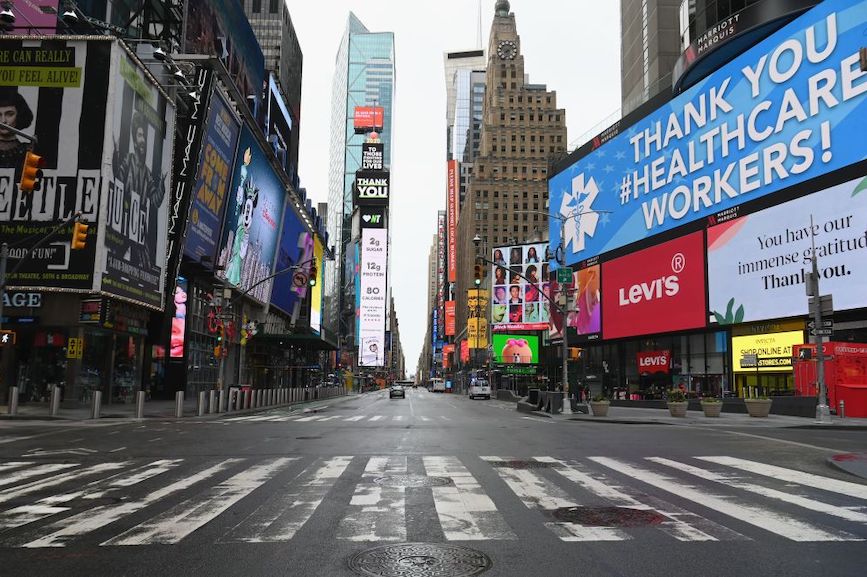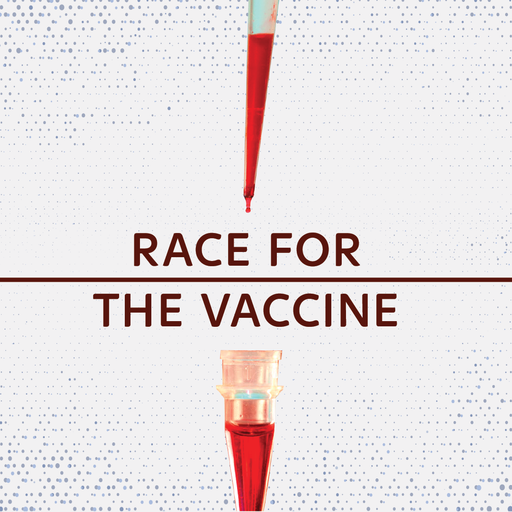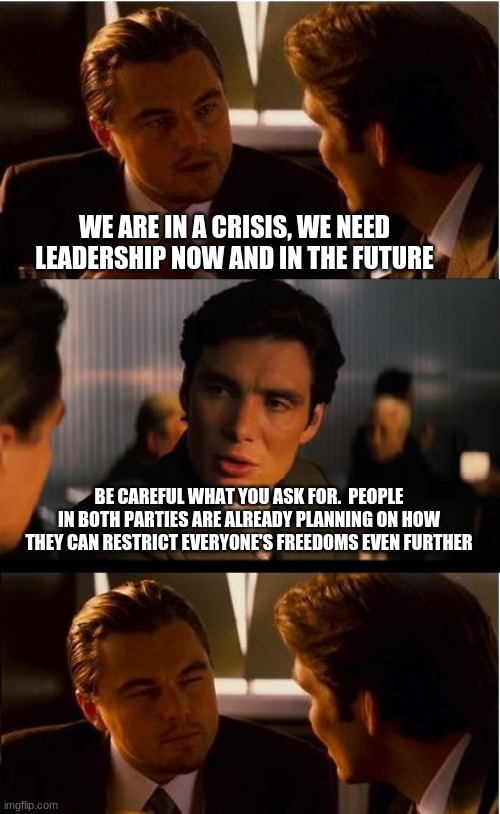Steve Barrett: The World WIll Never Be the Same Again
The coronavirus pandemic is causing fundamental changes to significant parts of our daily lives that will result in a new normal once COVID-19 is defeated.

Head into any major city around the globe right now and you will find a scene unrecognizable …
Vast numbers of office buildings and other expensive commercial real estate are now lying empty. And, candidly, most office-based workers are successfully continuing to carry out their jobs.
Sure, this comes with challenges, especially for those also charged with homeschooling children or living in cramped apartments with multiple occupants. But, in general, the world of work formerly based in offices has not fallen apart, much of it has continued as normal.
In 2018, the United Nations predicted 89% of North America’s population will live in urban areas by the year 2050, (easy to predict what is going to happen when you are the force that will make it happen.)
Marketing services agency network holding groups have often been compared to property companies, such is the amount of buildings they boast within their portfolios. They have sophisticated departments devoted to managing this real estate and shuffling the pack to maximize usage.
But, at the end of this horrible COVID-19 crisis, the concept of centering marketing and communications agencies and corporate HQs on expensive city-based locations will change. Agency holding companies (all companies) will dial back on real estate, of that there is no doubt. Agencies especially will instead double down on talent and clients. (Ya, they are clearing out their office spaces to make room for all the people they want to force into the city.)
At the boutique and small agency end of the market, times are going to be very tough, especially in niche areas such as travel, tourism, hospitality and fashion. A Harris Poll on COVID-19 released this week predicted that almost 40% of small businesses could be out of business within a month.
Education and healthcare have also been completely upended, though these too have different implications based on income levels. Parents have suddenly been plunged into a world of homeschooling or college-aged children returning home and learning virtually and remotely. Room and board charges may have diminished, but tuition hasn’t. Many will recalibrate the value of such payments, which will in turn lead to reassessments of the whole education system.
The environment has started to breathe more easily, as airlines slash the number of planes in the sky, factories ease down on production and there are fewer cars on the road. Animals have started reappearing in urban environments vacated by humans who are isolating indoors. And I’m not just talking about rats and foxes.
spacer
Consumption
While the supermarkets have seen sales in the last few weeks rivalling their busiest periods of the year, the lockdown has been disastrous for the high street.
Town and shopping centre retailers were already reeling from the rise of internet shopping, but with many who operate on tiny margins forced to close for potentially several months, there could be several chains which do not survive.
As the chains suffer, small retailers and local shops are thriving. With people dissuaded from driving and told not to shop for leisure, most people are relishing the chance to leave their homes to buy the food they need from a business close to home – with cafes and restaurants which have switched to providing takeaways apparently flourishing, and food providers like veg box suppliers reportedly selling out.
And those people who are able to get online supermarket delivery slots, who previously visited the stores, may decide they prefer it.
Consumer intelligence company Springboard thinks it may speed the change in the way we shop.
Meanwhile, with food supply chains suddenly under threat, people are finding themselves thinking differently about waste and how much they throw away.
The threat that we could return to the bad old days of the Winter of Discontent in 1979 has renewed our appreciation for the weekly or biweekly collection.
And there has been an explosion in articles and explainers advising people how to reduce waste, with Great Btish Bake Off star Nadia Hussain even teaching the frugal nation how to cook up banana skins.
We’re not going back to normal
Social distancing is here to stay for much more than a few weeks. It will upend our way of life, in some ways forever.

We don’t know exactly what this new future looks like, of course. But one can imagine a world in which, to get on a flight, perhaps you’ll have to be signed up to a service that tracks your movements via your phone. The airline wouldn’t be able to see where you’d gone, but it would get an alert if you’d been close to known infected people or disease hot spots. There’d be similar requirements at the entrance to large venues, government buildings, or public transport hubs. There would be temperature scanners everywhere, and your workplace might demand you wear a monitor that tracks your temperature or other vital signs. Where nightclubs ask for proof of age, in future they might ask for proof of immunity—an identity card or some kind of digital verification via your phone, showing you’ve already recovered from or been vaccinated against the latest virus strains.
We’ll adapt to and accept such measures, much as we’ve adapted to increasingly stringent airport security screenings in the wake of terrorist attacks. The intrusive surveillance will be considered a small price to pay for the basic freedom to be with other people.
As usual, however, the true cost will be borne by the poorest and weakest. People with less access to health care, or who live in more disease-prone areas, will now also be more frequently shut out of places and opportunities open to everyone else. Gig workers—from drivers to plumbers to freelance yoga instructors—will see their jobs become even more precarious. Immigrants, refugees, the undocumented, and ex-convicts will face yet another obstacle to gaining a foothold in society.
Moreover, unless there are strict rules on how someone’s risk for disease is assessed, governments or companies could choose any criteria—you’re high-risk if you earn less than $50,000 a year, are in a family of more than six people, and live in certain parts of the country, for example. That creates scope for algorithmic bias and hidden discrimination, as happened last year with an algorithm used by US health insurers that turned out to inadvertently favor white people.
The world has changed many times, and it is changing again. All of us will have to adapt to a new way of living, working, and forging relationships. But as with all change, there will be some who lose more than most, and they will be the ones who have lost far too much already. The best we can hope for is that the depth of this crisis will finally force countries—the US, in particular—to fix the yawning social inequities that make large swaths of their populations so intensely vulnerable.
spacer
Benjamin Netanyahu suggests microchipping kids, slammed by experts
“If the information with the kids’ location is uploaded to the internet, a pedophile with some cyber knowledge may invade the system and stalk them,” cyber expert Einat Meron said.

Cyber experts slammed Prime Minister Benjamin Netanyahu for his proposal to “microchip” children who return to schools and kindergartens as the coronavirus lockdown is lifted, Ynet reported on Friday.While speaking at a press conference on Monday, Netanyahu suggested the Health Ministry use new technology to help Israel adjust to its new routine as the state is lifting the coronavirus lockdown. “That is, technology that has not been used before and is allowed under the legislation we shall enact,” he clarified.“I spoke with our heads of technology in order to find measures Israel is good at, such as sensors. For instance, every person, every kid – I want it on kids first – would have a sensor that would sound an alarm when you get too close, like the ones on cars,” the prime minister said.“It will be hard to do it to more than a million schoolchildren who return to their educational institutions in order to ensure one student sits at the distance of two meters from another. It is fictional and dangerous,” cyber resilience expert Einat Meron told Ynet.“Theoretically, I get the idea behind it,” she said. “But although such distance-sensitive microchips exist in vehicles, it is different in humans.” According to Meron, “a beeping sound telling me I got close to someone is not enough. Who says it will change anything? I would have gotten closer either way.”The expert added that “the actual issue is the enforcement, and here everything changes.” Meron told Ynet that “microchipping children will not pass any test – both practically and legally.” Similar to Meron’s notion that notifying citizens on their distance will not affect their actions, many fear the state would make use of the information available from the sensors.“If the information with the kids’ location is uploaded to the internet, a pedophile with some cyber knowledge may invade the system and stalk them outside their schools, follow them and distribute the information on other platforms,” Meron said. “Can the state take responsibility for that?”The Prime Minister’s Office responded to the report, telling Ynet Netanyahu’s suggestion “is not to be implemented through databases, but through simple technology notifying [the citizens] about their distance. It is a voluntary option that is designed to help children keep their distance, like Mobileye with vehicles.”The office added that the prime minister’s suggestion is “an idea that may help maintain social distancing, and there will not be any violation of privacy.“On Wednesday, Walla reported the movements of all vehicles in Israel were tracked by police and stored in an unregulated database named Eagle Eye. A source cited by the media site said the information “may be kept for years on end.”The Association for Civil Rights in Israel (ACRI) reportedly submitted a request under the Freedom of Information Act that police disclose the extent of the operations of Eagle Eye, as well as the time the information on citizens’ movements is stored in the system.Israel Police responded to ACRI, saying the system’s activity was not standardized internally despite several years of operations. “Either way, once finalized, the procedure will not be disclosed to the public,” police added.In late March, Yediot Aharonot reported a classified Shin Bet (Israel Security Agency) database stored information on all Israeli citizens and most Palestinians from the West Bank. The data tracked by the security agency included movements, phone calls and text messages.
spacer

COMMENTARY / WORLD
Time to build the post-pandemic world order

The fight against COVID-19 is unlike a typical interstate conflict. The enemy is not a human or a state, but a virus. This ought to be a time for countries around the world to come together to confront a common enemy.
But that is not what is happening in the world. Antagonism between the United States and China is deepening to the point of becoming irreparable. The whole world has scrambled to procure ventilators and masks. With the global supply chain ruptured, states are placing medical products and other strategic resources and components under national control.
The United Nations Security Council is incapable of addressing the crisis and a politicized World Health Organization is losing its credibility. Meanwhile, the European Union has once again demonstrated that it cannot deal with crises effectively. With cyberspace awash with fake news and disinformation, Russia and China have launched their own forms of information warfare. We are witnessing the rapid collapse of the postwar liberal international order.
The new coronavirus represents a new battlefield in international politics that will determine the rise and fall of nations. It is also a contest to determine what type of state and what type of society will prove to be the most resilient.
Given the potential for a second and third wave of the pandemic, it is still too early to ascertain the outcome of this contest. Yet the virus is particularly vicious to the most vulnerable members of society. American and European societies have been weakened by disparities in wealth, education and health, growing social divisions, political polarization, and the forces of populism and xenophobia.
Meanwhile, Taiwan, South Korea, Vietnam, Australia, New Zealand and Hong Kong have skillfully fought back against COVID-19 by eliminating opportunities for the virus to enter and take hold. These governments have resolutely mobilized digital technologies to weather this crisis and demonstrated the resilience of their societies.
When it comes to the fight against the new coronavirus, existing categorizations of states — as developed or developing, democratic or autocratic, Western or non-Western — are of little use. The ultimate victors of the fight will be the states where casualties can be kept to a minimum while economic and social activity (particularly employment) is preserved to the maximum extent, and where citizens managed to sacrifice certain civil liberties in order to band together against the virus.
Failure to achieve these goals will inevitably damage the legitimacy of any type of political system or authority. The competition surrounding different political-economic systems will change from an export-competitiveness model, in which a country posits the universality of its own system (as has been the case with the foreign policy of promoting democracy abroad), to a model based on domestic-demand competitiveness, in which a country demonstrates how a model employed domestically produces strong performance.
This is not only a battle about now but also over what comes next.
The conversion to a contact-less economic and social system during the current pandemic has involved various initiatives in online medical care and education, teleworking, automated customer service, unmanned delivery systems and automated production lines. The key to such innovations has been society’s practical application of personal data. Societies that succeed in establishing a form of data governance supported by citizens will emerge as “developed states” in the age of dataism.
The principle of free trade, meanwhile, will be amended to address core concerns of national security and economic security. States must fuse trade strategy and industrial policy with investment and currency strategies, build effective public-private partnerships rooted in mutual trust, strengthen national power, wealth and resilience, and develop the political strategy and governance to sustain these achievements. The states that play a leading role in creating an international order for this new era in geoeconomics will emerge as victors.
At some point the COVID-19 crisis will end. But as was the case with the first and second world wars, the end of the crisis will not mark a return to “normal.” Rather, it will signal the advent of a “new normal.”
By the end of World War II, the Allied powers — especially the U.S. and Britain — already had a vision for the postwar international order. The Atlantic Charter was a blueprint for the postwar world order drafted jointly by U.S. President Franklin D. Roosevelt and British Prime Minister Winston Churchill in August 1941. In the midst of the war, and even before the onset of the Pacific War, these two leaders reconciled their respective geopolitical interests to envision the rules, norms and world order of the future “postwar” era.
The entire framework of the liberal international order originated in the Atlantic Charter, including the Bretton Woods system (the International Monetary Fund and GATT), NATO and the Japan-U.S. security alliance, the OECD and the Group of Seven.
According to Brookings Institution President John Allen, a retired U.S. general, “History will be written by the ‘victors’ of the COVID-19 crisis.” That is why it is now, at the very peak of the crisis, that Japan, together with like-minded countries, should draft a blueprint for the post-pandemic world order.
Yoichi Funabashi is chairman of the Asia Pacific Initiative and a former editor-in-chief of the Asahi Shimbun. This is a translation of his column in the monthly Bungei Shunju.
spacer
I am hoping that you have come to recognize that this VIRUS is being used to bring in the NEW WORLD ORDER and TRANSHUMANIST Agenda. It is a real virus, but I believe it is man made and weaponized. Regardless, real or not, man made or not it is a tool in the hands of the elite to rob you of your freedom, isolate you from human contact, indoctrinate you into technology and CONTROL EVERY ASPECT OF YOUR LIFE!
spacer
The following video footage came from a very real and very strange session of Congress. YES, the document being read (though mostly censored) is a real document read before the Congress for consideration. At the time (2008) it seemed really weird to me. Why the heck was our military concernced about a Zombie Apocalypse and what were the superhuman entities they mentioned in that document. Today, it is eerie. When you think about what is coming our very near future this document is frightening.
Imagine what will happen in our society when the food supply is wiped out and people are starving. After being imprisoned for months by the COVID 19 Virus, and surrounded by the anger, tension, fear and frustration of the race war and police brutality struggle people are not going to be rational. We have been conditioned to accept cannibalism, and we have been fed human flesh in our drinks and processed food. Turning to cannibalism is in the realm of probability and so is the ZOMBIE APOCALYPSE.
The rich elite have been preparing for this for years. They have safe quarters constructed underground where they are already growing and storing their own food supply. They can sit back and watch us wipe each other out on their big screen.
 Classified Rep. John Haller About Bill HR 8791 The Homeland Terrorism Prepareness Bill Classified
Classified Rep. John Haller About Bill HR 8791 The Homeland Terrorism Prepareness Bill Classified
“Congress shall now vote for approval of HR 8791, the Homeland Terrorism Preparedness Bill. Said bill request emergency response funding up to and including 1 TRILLION dollars to prepare for national level terrorist attack and/or attack from UNIDENTIFIED BEINGS. Funding for first responder personnel and vehicles will be doubled if said attack leads to more than 80% of national population being effected by UNIDENTIFIED BEINGS. This funding shall commence in conjunction to the first attack on THE UNITED STATES or the first large scale outbreak of VIRUS X depending on upon which comes first. Civillian and military units shall be trained in containment and combat of UNIDENTIFIED BEINGS including iratirated MUTANTS with possibility of VIRUS X BEING airborne, OR THE POSSIBILITY OF flesh eating, HOSTS and/or all the above. In such event as A DOMESTIC REVOLT ON US SOIL OR spewing/UNIDENTIFIED BEINGS escape or released or otherwise become uncontrollable, Air Force units may also be directed to combat said BEINGS due to their enormous size and other worldly strengths. Should event occur in urban areas, Jesus… That’s DANGEROUS, far surpassing our darkest nightmares. Should casualties exceed 100,000,000 PEOPLE, body disposal actions should be holded and associated resources shall be reallocated through SEWAGE SYSTEMS underground FEMA-BASED protective birthing centers. A new bill of rights shall be drafted and approved by THE ELITE OF TEN. Having now reviewed the bill, I ask you to please cast your votes.”
 Photo by Straight 8 Photo
Photo by Straight 8 Photo
The recent global coronavirus (COVID-19) pandemic brought with it droves of believers that the zombie apocalypse finally arrived. It hasn’t. This is an ugly virus that’s killing some and leaving the rest of us who aren’t busy on spring break locked inside fighting boredom. All of that aside, COVID-19 did drudge up memories of CONOP 8888. Not familiar? Let us indulge you.
CONOP 8888 Details
The Pentagon has a detailed zombie response plan called CONOP 8888. There are a lot of acronyms and bureaucratic lingo in this 30-page document. It makes mention of nine different types of zombies and plans to defeat them. It also reports on experimentation in the occult and chicken zombies. CONOP 8888 is an odd government document, but we should applaud Uncle Sam for thinking outside the box!
*Disclaimer: CONOP 8888 is a training tool for USSTRATCOM (U.S. Strategic Command) planners. It gives us a glimpse into what an emergency plan for a massive scale disaster might look like. It may even shed some light on how the government looks at the COVID-19 crisis.
CONOP 8888 is incredibly thorough and worded like a lengthy tax document. It includes a list of nine types of zombies, paired with offensive and defensive strategies for each threat. My favorite is the evil magic zombie created through, “experimentation in the occult.”
Also noteworthy are weaponized zombies created by hostile actors, and chicken zombies created through improper euthanasia.
What’s the Point?
CONOP 8888 outlines a three-pronged plan to achieve its purpose of, “preserving the sanctity of human life.”
Step one is to establish a defensive condition, step two to eradicate the zombie threat, and step three to maintain law and order and return basic services. Establishing a defensive condition in step one involves monitoring zombie activity and predicting potential threats. Step two involves eliminating the threat through force. Meanwhile, step three involves maintaining an image of an in-tact government, and facilitating the transition back to civil authorities from martial law.
Put aside references to pop culture and absurdities like “vegetarian zombies” (zombies that don’t feed on humans), the three-pronged plan for defeating zombie hordes can apply to nearly any disaster. Take, for instance, a pandemic like the one we’re currently battling.
Step One
Maintaining a defensive condition would mean monitoring known hotbeds of novel disease for outbreaks, and also dealing with conditions known to be conducive to the creation of new threats. COVID’s current pandemic status is evidence we’ve failed in that regard, thanks in large part to secrecy in certain communist governments that we won’t mention … China.
Step Two
Secondly, eliminating the threat would mean creating and distributing drugs to treat infection and a vaccine to prevent it. Both of these options take time and it’s still too early to tell how we’ll fare in this regard.
Step Three
Maintaining order and returning basic services translates directly. It doesn’t look like we’ll need a full switch to martial law. However, the closures of businesses and schools in certain cities amounts to a suspension of basic services in itself. We’re still in the beginning stages. People are panic buying guns and ammo and, even worse, cleaning supplies. Water is still running, so societal stability probably won’t be an issue. The real challenge is figuring out how to help those put out of work by the crisis. We need to work on how to stimulate growth once COVID-19 runs its course.
Check out our sister site BallisticMag.com for a collective guide of facts, tips and more on COVID-19. Also, get in on the conversation on Facebook and Instagram!
I trust that you have noticed that ALL of these changes were already in the works BEFORE the VIRUS was released. They just were not moving quickly enough. This VIRUS was just what the elite needed to push their Agenda forward. It is so convenient, that it hit right when the got all their pieces in the right places to accommodate the quarantine and move us into the NEXT PHASE of their PLAN.
spacer




 Classified Rep. John Haller About Bill HR 8791 The Homeland Terrorism Prepareness Bill Classified
Classified Rep. John Haller About Bill HR 8791 The Homeland Terrorism Prepareness Bill Classified